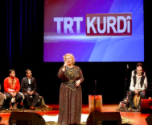Scholars and activists welcome the new Kurdish channel in state television and ask for improved rights to private channels amid reactions from main opposition party and some circles of the Kurdish movement.
Republican People's Party (CHP) president Deniz Baykal criticized the incentive, saying, "the state shall remain blind to ethnic identities of citizens" and spending public money to that end.
"Public broadcasting should benefit all citizens. Politicians must review their approach to notions like state of law and rights of citizens, plurality and equality," professors Özden Cankaya of Galatasaray University, told bianet.
"This channel could provide an opportunity to bring education services to Kurdish speaking population in Turkey, who are deprived of such for a long time. I would also contribute to efforts of peace."
Turkish Radio and Television (TRT) begin broadcasting in Kurdish on January 1st, through the newly established TRT 6. Consisting of programs aimed at children and women as well as cultural and news bulletins, the new channel is on air 12 hours a day. Renowned Kurdish artists such as musician Rojin take part in the broadcast.
While the government promotes TRT 6 as a part of its plans to recognize cultural plurality in the country, some criticize the move as insincere and as a political trick to win Kurdish votes before the upcoming local elections in March.
Lack of a sound lawful base for the broadcast provides grounds for this argument. A procedure for TV and radio broadcasts in "languages other than Turkish that are traditionally used by Turkish citizens were established in 2006.
On the other hand, the foreseen broadcasts were limited to 45 minutes a day, subtitles in Turkish were mandatory and programs aimed at children were banned. Local TV stations like Gün TV faced pressures and prosecutions upon claims of violating this code.
"Without a new law, introduction of TRT 6 won't benefit us" said Ahmet Birsen of Gün TV.
"Our channel was closed for a year for airing Şivan Perwer's song Xalo. Now, it was on TRT 6 on its opening day. Implementation of the law remains arbitrary."
Reiterating the argument, pro-Kurdish Democratic Society Party (DTP) MP Gültan Kışanak insisted that without recognizing the same rights for private channels, TRT 6 would remain a hoax to undermine their struggle for cultural rights.
On the other hand, president of the Women's Center (KA-MER) in Diyarbakır, Nebahat Akkoç, welcomed the incentive as an important step.
"We'll intervene to influence the content of the broadcast. Women in could benefit from TRT 6 if they could learn their rights in their own language."(EÜ)








